
Latest News
- Hyundai E&C Becomes Key Player in the Nuclear Decommissioning Market
- Hyundai E&C Accelerates Global Nuclear Expansion into the U.S. Nuclear Market
- Hyundai E&C Shifts into High Gear to Enter Nordic Large-Scale Nuclear Market
- Hyundai E&C Strengthens Korea-Japan Cooperation in Energy Transition and New Growth Businesses
- Hyundai E&C Signals Green Light for Large-Scale Nuclear Power Plant Business in Europe
Why is Hyundai E&C Eyeing Indonesia, “Land of Opportunity” with Great Future Potential?
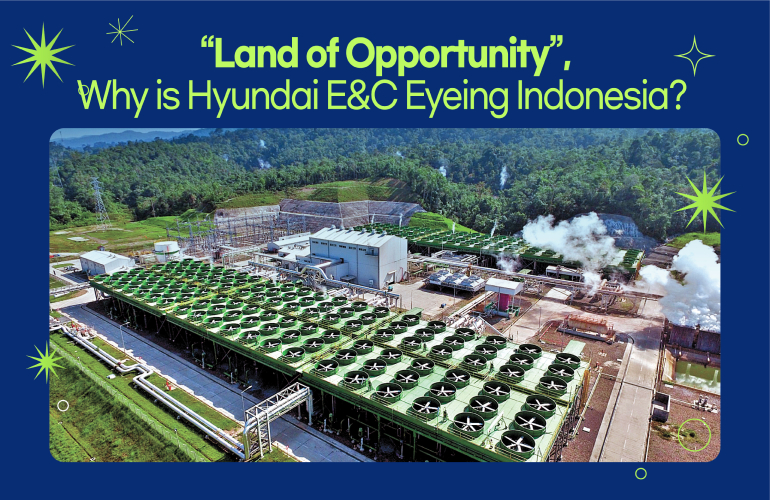
Indonesia: Fast-growing Mega Market in Southeast Asia
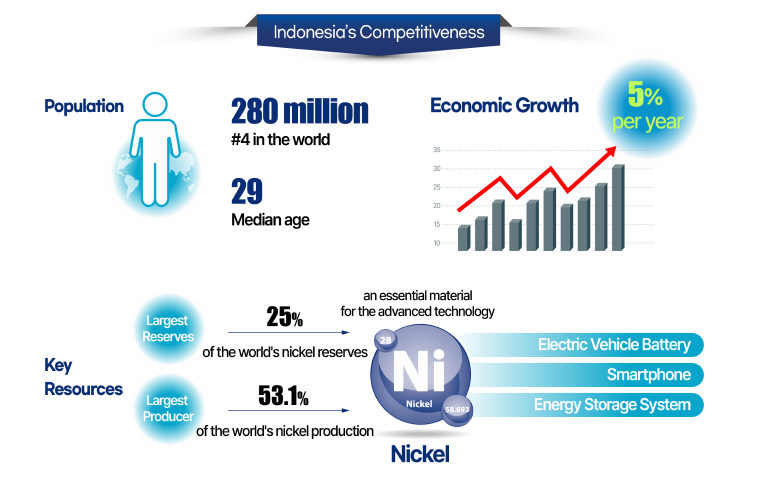
Indonesia is a mystical land of abundant natural resources, tropical jungles, and 18,000 islands. While it's known for its “ pristine natural environment”, it's actually a country with immense growth potential. Indonesia is the world's fourth most populous country, home to nearly 280 million people, making it a young and vibrant nation with a median age of 29. With a high proportion of working-age population, the economy has recovered quickly from COVID-19, sustaining strong economic growth rates of around 5% annually.
Indonesia's national competitiveness extends beyond its large population—it's also home to the world's largest nickel reserves, a critical mineral essential for secondary batteries. Indonesia accounts for an impressive 53.1% of global nickel production, a key component in advanced technologies like EV batteries, smartphones, and energy storage systems and more, making Indonesia a pivotal supply chain for global industries. As such, Indonesia is one of Asia's hottest markets, with many global companies now lining up to invest in the country.
Indonesia is gearing up for yet another transformation that the world is watching closely as it aims for more robust economic growth and development. This transformation is the Capital Relocation Project, a $35 billion endeavor to move the capital from Jakarta to Nusantara by 2045. Construction began in 2022, and the move is set to take place on Independence Day, August 17 this year (2024). The new capital, Nusantara, will span 2,561 square kilometers, four times the size of Seoul. The capital's relocation is expected to address Jakarta's extreme population concentration, promote balanced national development, and establish a new economic center.
Indonesia is seen as a “land of opportunity” with significant potential for global investors, thanks to its strategic location in Southeast Asia, large market, and proactive government policies. Hyundai E&C has been present in Indonesia since the official establishment of diplomatic relations and completed 27 projects in half a century.
50 Years With Indonesia: Hyundai E&C's Major Projects
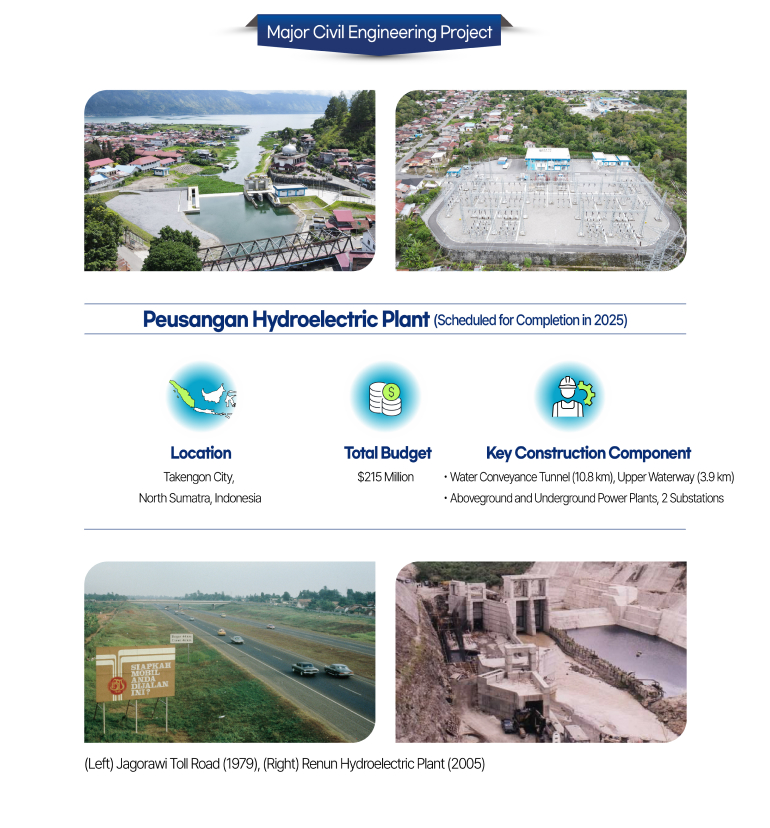
The civil engineering projects completed include the Jagorawi Toll Road (1979), Pasir Port (1992), Ancol Baru Coastal Reclamation (1999), and Renun Hydroelectric Plant (2005), with the Peusangan Hydroelectric Power PLant currently underway.
The Jagorawi Toll Road was Hyundai E&C's first project in Indonesia, enabled by the company's successful track record in Southeast Asia, including the Pattani-Narathiwat Highway in Thailand during the 1960s. This 52 km highway connects the capital, Jakarta, with Bogor and Ciawi, with its name derived from these three cities. Despite challenging conditions such as extreme weather and unfamiliar environments, Hyundai E&C successfully completed the project, playing a crucial role in building strong trust with the Indonesian government, the project's client.
The Peusangan Hydroelectric Power Plant also holds special significance. Scheduled for completion in 2025, this construction project is currently underway in Takengon City, in the northwest of Sumatra, Indonesia, with a total contract value of $215 million. The project includes a 10.8 km water conveyance tunnel, a 3.9 km upstream waterway, aboveground and underground power plants, and two substations. Once completed, the Peusangan Hydroelectric Power Plant is expected to significantly enhance the stability of Indonesia's power supply.
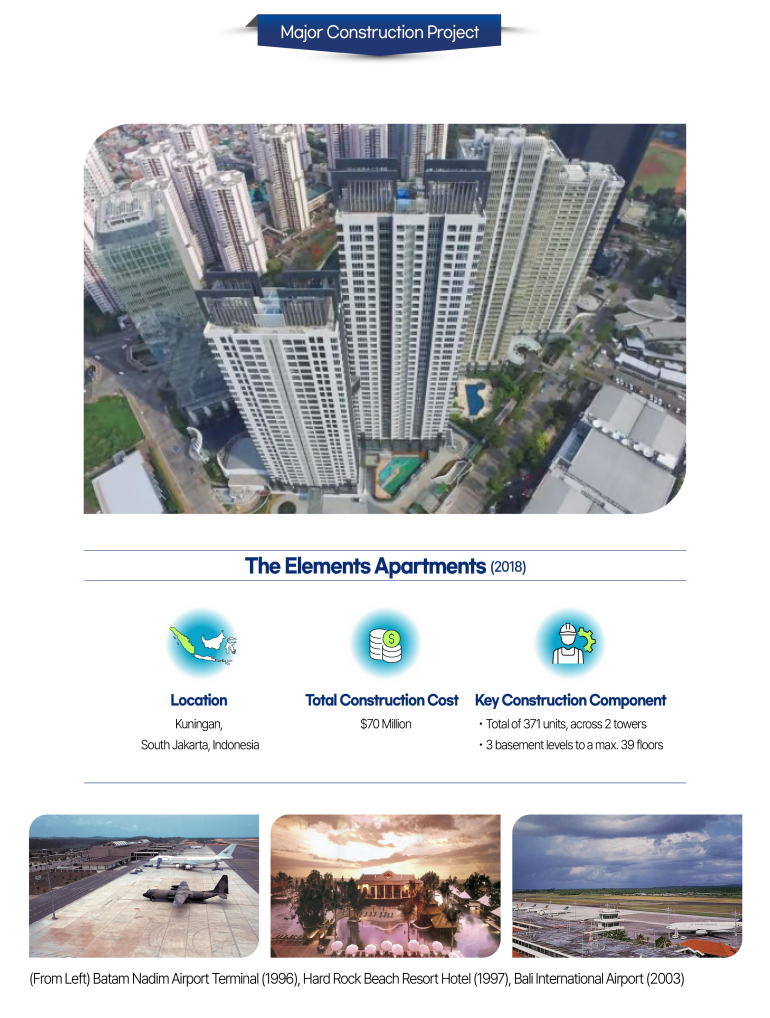
Hyundai E&C's achievements in the field of architecture are even more remarkable. With 11 construction projects, including The Elements Apartments and The Shangri-La Residence, which were completed in parallel in 2018, Hyundai E&C has significantly improved the urban environment in Indonesia. The Elements Apartments is a 371-unit luxury residential complex that combines modern design and cutting-edge technology with up to 39 floors, providing residents with a convenient and safe living environment. The Shangri-La Residence, a 359-unit apartment complex with luxurious interiors and amenities rising up to 57 floors, is lauded for raising the standard of living in Jakarta and transforming the city's skyline.
Moreover, K-Construction also raised its profile through the construction of international airports and five-star hotels, including the Batam Hang Nadim Airport Terminal (1996), Bali International Airport (2003), Hard Rock Beach Resort Hotel (1997), and The Westin Jakarta Hotel (1999).
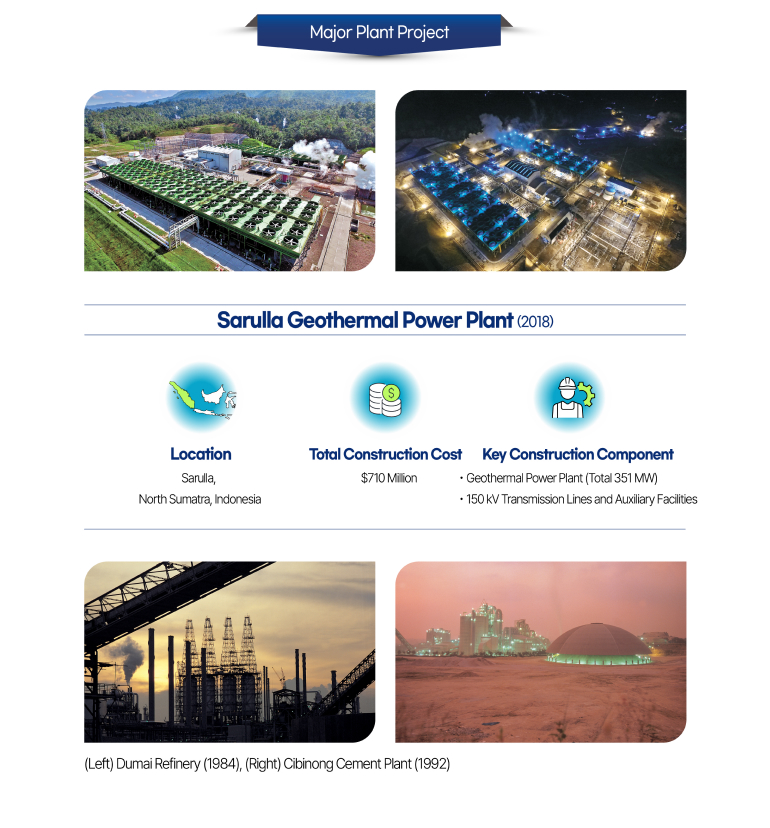
How about the plant sector? Hyundai E&C has completed a total of 11 projects in Indonesia, including the Dumai Refinery (1984), the Cibinong Cement Plant expansion (1992), the Suban Gas Development (2007), and the Sarulla Geothermal Power Plant (2018). The Sarulla Geothermal Power Plant is especially significant as it was the first project where Hyundai E&C managed the entire process, from design to commissioning. This project involved constructing three 110 MW geothermal power units in the Sarulla region of northern Sumatra. Moreover, the Sarulla Power Plant, the world’s largest single geothermal power plant, has the capacity to supply electricity to 210,000 households, making a substantial contribution to Indonesia's increased use of geothermal energy.
Beyond just building infrastructure, Hyundai E&C has been instrumental in unlocking Indonesia's growth potential. The company has supported the development of national industries, established a foundation for economic growth through a reliable power supply, and contributed to the country's energy independence.
Indonesia Strategic Partnerships and Future Prospects
The strategic partnership between South Korea and Indonesia has become a crucial element in shaping the future of both nations. This collaboration is driving economic growth and infrastructure development in Indonesia, while also highlighting Korean technology and innovation on the global stage. How are Korea and Indonesia, along with Hyundai E&C and Indonesia, paving the way for mutual development and a shared future?
.jpg)
First, the "Capital Relocation" project. This large-scale initiative to move the capital from Jakarta to Nusantara in Kalimantan, Borneo, is modeled after Korea's administrative center, Sejong Special Self-Governing City. Since 2019, the Korean government has been actively supporting Indonesia's successful capital relocation by sharing its experience in building an administrative center, aimed at enhancing administrative efficiency and promoting balanced development. As cooperation between the two countries strengthens, it is anticipated that collaboration between Indonesian and Korean companies will be further facilitated and strengthened going forward.
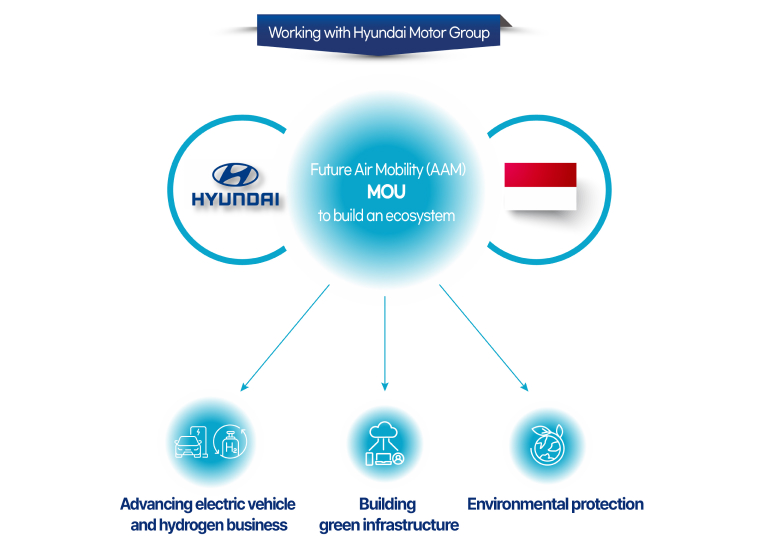
The second is our collaboration with Hyundai Motor Group(HMG). In 2022, Hyundai Motor Group established the first automobile production base in the Association of Southeast Asian Nations (ASEAN) at the Deltamas Factory in Bekasi, Indonesia, with an annual production capacity of 250,000 units, including the Ioniq 5 and Santa Fe. In the same year, HMG signed a Memorandum of Understanding (MOU) with Indonesia's New Capital Development Agency to build an ecosystem for Advanced Air Mobility (AAM). This initiative is expected to foster the development of the electric vehicle and hydrogen business in Indonesia and further promote the development of infrastructures related to the introduction of eco-friendly transportation. It is also anticipated to have a positive impact on environmental protection in Indonesia.
Thirdly, Hyundai E&C will continue to be a partner for sustainable development in Indonesia based on the partnership we have built over the past 50 years. With Indonesia's economic growth and capital relocation, we look forward to continued cooperation in high-tech industries in the future. Hyundai E&C is already a member of Team Korea to cooperate on the relocation of Indonesia’s capital. It is a public-private initiative with the National Agency for Administrative City Construction, and Hyundai E&C is working together with K-water, Korea Land and Housing Corporation, and the International Contractors Association of Korea as well.

